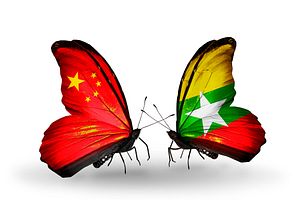China’s CITIC Group Corporation has won two contracts related to a special economic zone in western Myanmar, Reuters reports, including building a deep sea port on the Bay of Bengal. CITIC’s consortia (including China Harbor Engineering Company Ltd., China Merchants Holdings, TEDA Investment Holding, and Yunnan Construction Engineering Group) will lead projects to build the port as well as an industrial area at the Kyaukpyu Special Economic Zone in western Myanmar’s Rakhine State, which borders Bangladesh to the north and the Bay of Bengal to the west.
The contracts give yet another Chinese company a pivotal role in developing maritime infrastructure on the Indian Ocean, adding to China’s involvement in a number of regional ports (Chittagong in Bangladesh, Gwadar in Pakistan, and Colombo in Sri Lanka). Taken together, those ports are sometimes referred to as China’s “string of pearls” — a concept that assumes they will be of military as well as civilian use.
Kyaukpyu is of particular interest to China because overland links between Myanmar and southern China can reduce reliance on the potential chokepoint of the Strait of Malacca. By eliminating the need to travel via the Strait of Malacca, Kyaukpyu Port would save about 5,000 kilometers in sailing distance for shipments traveling to China from India and points beyond. The drive to diversify its shipping routes – and to increase economic clout in neighboring countries – is a major impetus behind the new “Belt and Road” initiative, which envisions infrastructure and trade networks linking China with every part of the Eurasian continent.
Though the project fits neatly into the Belt and Road framework, China’s cooperation in the Kyaukpyu Special Economic Zone was in the works years before the strategy was announced. In 2009, Myanmar’s Ministry of Energy signed a memorandum of understanding with China National Petroleum Corp. (CNPC) on an oil pipeline linking Maday Island in Kyaukpyu with China’s Yunnan province. That pipeline, which allows crude from the Middle East to be unloaded in Maday and shipped overland to China – again, bypassing the Strait of Malacca — was completed in January 2015.
Also in 2009, CITIC Group signed a separate MoU with Myanmar’s Ministry of National Planning and Economic Development on constructing a deep sea port and railway network in the Kyaukpyu Special Economic Zone. Unlike the oil pipeline, the rail and port MoU languished; the railway MoU expired in 2014 without construction ever beginning. Today, however, the port deal gained new life with the contract awarded to CITIC Group’s consortium.
Yet Chinese projects face more headwinds in Myanmar today than they did in 2009. Popular opposition to Chinese construction projects gained steam under the new civilian government of Thein Sein, most notably leading to the suspension of construction on the Chinese-backed Myitsone Dam in 2011. That groundswell of public opposition has already impacted the Kyaukpyu Special Economic Zone. When the Kyaukpyu-Yunnan railway project was canceled, Railway Minister Myint Wai said it was “in accordance with the public’s demand” to not carry out the project. However, the Kyaukpyu-Yunnan oil pipeline, which also faced vocal criticism, particularly from environmental activists, was completed as planned.
Already, some in Myanmar are raising concerns about the Kyaukpyu Special Economic Zone, which was approved by the country’s parliament on Tuesday. Ba Shin, a lower house legislator from Kyaukpyu, shared his concerns with Reuters: “It isn’t known whose land will be seized and how they will be compensated… Nothing is known about the potential developers and investors. There are growing concerns and doubts among the people due to lack of transparency.”
It will be up to the newly elected National League for Democracy government to decide how they want to handle the potential controversies of developing Kyaukpyu with Chinese companies. In doing so, the NLD and leader Aung San Suu Kyi will have to balance the need for smooth relations with their neighbor to the north with the legitimate concerns of Myanmar’s people.

































